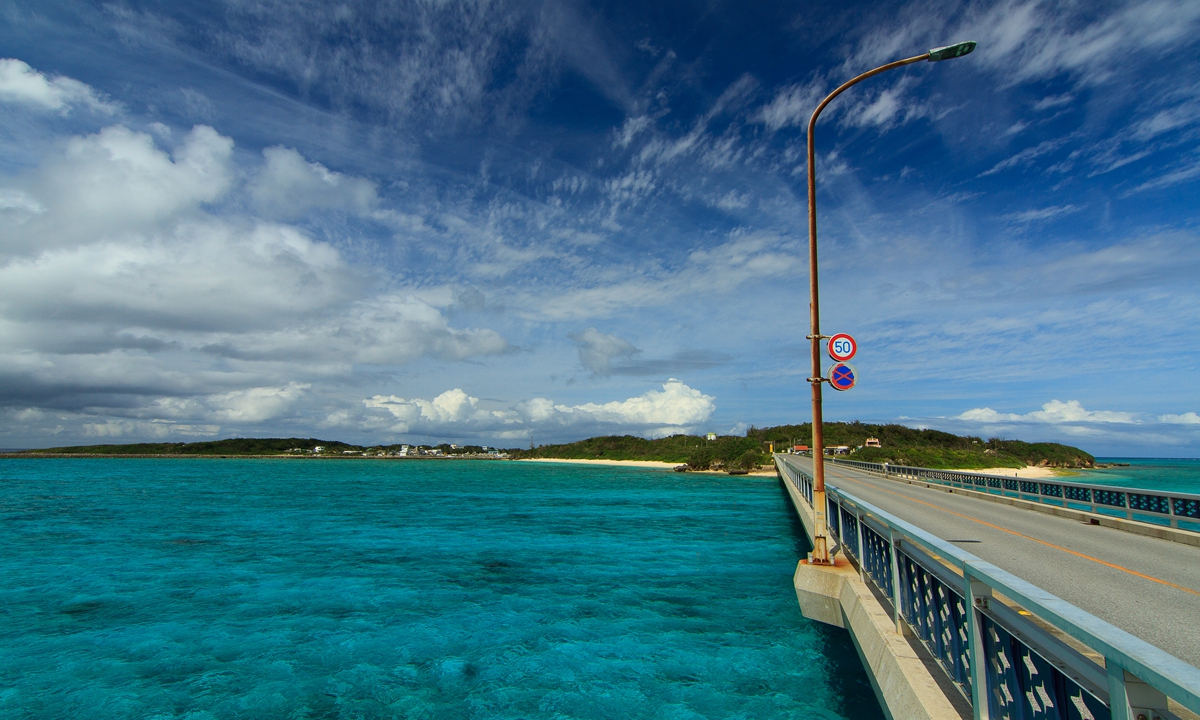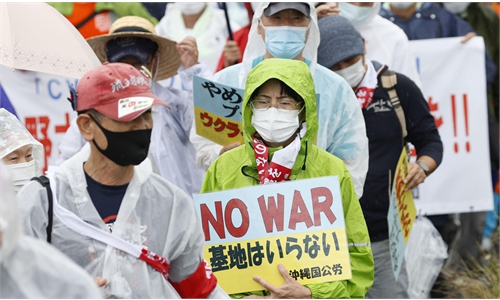IN-DEPTH / IN-DEPTH
Feel the friendship between ancient China and Ryukyu at graveyard ruins in Zhangjiawan in Beijing

The view of Okinawa, Japan Photo: VCG
Okinawan Governor Denny Tamaki is scheduled to arrive in Beijing on Monday, starting his visit to China, during which time he plans to go to the graveyard ruins of people from the Ryukyu Kingdom in Zhangjiawan township in Tongzhou district, on the outskirts of Beijing.A Global Times reporter recently visited the graveyard ruins with historians and some residents from Okinawa, and was impressed by the profound relationship that was cultivated between the Ryukyu Kingdom and ancient China in the vast era of history.
The graveyard is located near Lichanan village, Zhangjiawan township. A blue sign which reads "Ryukyu Kingdom Graveyard Ruins" 100 meters from farmland, announces the exact location of the historical site. A brief introduction on the sign notes that 14 people from Ryukyu were buried at the graveyard after succumbing to illnesses during the Qing Dynasty (1644-1911). Among those interred were tributary envoys and students dispatched by the Ryukyu government, who enjoyed high status in society and were knowledgeable in their time. The graveyard thus became an honored place of burial for high-ranking officials from the Ryukyu Kingdom in China.
The Global Times reporter noticed that some tributes had been placed in the graveyard ruins, such as bouquets, bottles of wine, and rice bowls. In Beijing's intense summer heat, there were also workers repairing roads leading to the graveyard.
Zhangjiawan was about 32 kilometers from Beijing during the Ming and Qing dynasties, and was an important pier of the Beijing-Hangzhou Grand Canal and a gateway to Beijing. At the time, envoys and students deployed by successive Ryukyu governments landed in East China's Fujian Province and went north along the Grand Canal all the way to Zhangjiawan. They then took horse-drawn carriages to Beijing. Thereafter, Zhangjiawan became an important place for the Ryukyu people. Visitors from Ryukyu would stay there for several months or several years before they went to Beijing city.
"The Ryukyu people who fell ill and died were buried at the graveyard in Zhangjiawan," Gong Hui, associate researcher with the Research Base for Beijing Studies, Beijing Union University, told the Global Times.
"The Ryukyu graveyards in Zhangjiawan in Beijing and Fuzhou, Fujian Province, are the two spiritual lands of the Ryukyu people on the Chinese mainland," Xu Yong, a professor in the Department of History at Peking University, told the Global Times.
But as most of the people buried in Zhangjiawan were officials and students, including Rin Seiko, a Ryukyu Kingdom scholar-bureaucrat and diplomat, the Zhangjiawan graveyard site has had a more profound influence on the relationship between China, the Ryukyu islands, and Japan, he said.
Students from Ryukyu to China in the Ming and Qing dynasties were an important element in fostering friendly relationship between China and Ryukyu. At the time, students from Ryukyu would have roughly been divided into two categories. In the first category were students dispatched by the government who studied at the Beijing Guozijian, the highest institute of learning in China's traditional educational system at that time and all costs during their stay in China were borne by China. In the second category were self-funded students, most of whom studied in Fuzhou.
"Ryukyu students in China at the time fervently learned about the Chinese civilization, Chinese culture, and the Chinese language. They made great contributions to the development of the Ryukyo Kingdom, so the impact of Chinese culture on Ryukyu is profound. Yuki Izumikawa, a special researcher at the Institute of Economics and Environment," Okinawa International University, revealed to the Global Times.
Izumikawa said that the friendly exchanges between the Ryukyu Islands and China have a history of more than 600 years. the graveyard ruins in Tongzhou are a symbol of friendly exchanges between the two countries at the time, reflecting the extensive and profound nature of their interactions.
"Tamaki's visit to the graveyard ruins is reasonable as it is in line with the interests of both sides in economic and cultural exchanges. It is not only a significant event for future cultural exchanges between the two sides, but also a natural outcome of the historical friendship," Xu said. According to Xu's observations, in the last decade, many Ryukyu people from various walks of life have visited the site, pouring libation and paying their respects to the deceased in the village field. The continued respect for ancestors and the enthusiasm for China-Ryukyu friendly exchanges among the Ryukyu people are touching and thought-provoking.
During the period of the War of Resistance against Japanese Aggression (1931-45), local Chinese villagers were unaware of Ryukyu's history of being annexed by Japan and mistakenly regarded Ryukyuan people as Japanese. As a result, they defaced tombstones, according to Gong.
The tombstone of the Ryukyu official Wang Daye (Chinese name) is believed to be the only remaining stone tablet in the cemetery and is now stored in the Tongzhou Museum. The Global Times reporter did not personally see this tombstone during the visit to the museum, but the staff revealed that the tombstone is currently being kept in the museum warehouse and will be shown to Tamaki during his visit.
The Global Times reporter learned that after concluding his visit to Beijing, Tamaki will visit East China's Fujian Province, which has a deeper connection to the Okinawa Prefecture as they have established friendly relations. Fujian Province is rich with historical sites such as the Ryukyu Cemetery in the capital Fuzhou.
Izumikawa told the Global Times that if Tamaki pays tribute at the Ryukyu graveyard ruins in Beijing and visit Fujian Province as planned, it will provide an opportunity to review the history of friendly exchanges between Ryukyu and China, and contribute to the further development of friendly relations between Okinawa and China.
Izumikawa placed his hands together in front of the Ryukyu graveyard ruins, offering prayers for the ancestors interred in China and wished for a lasting friendship between Okinawa and China.

